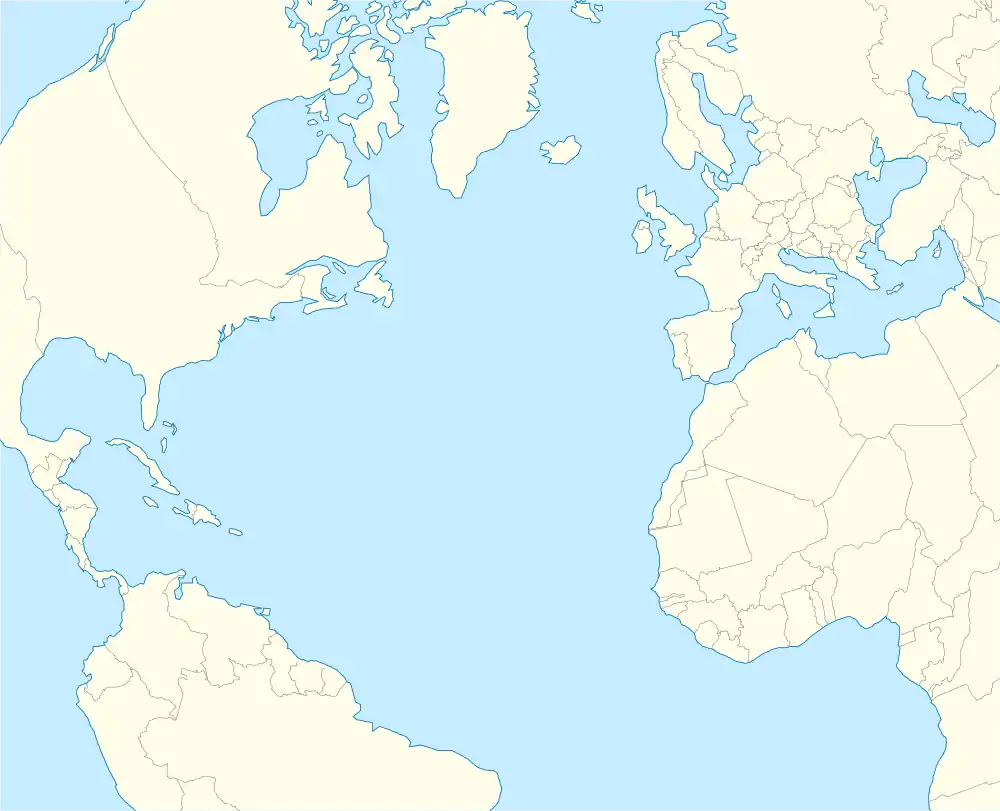SS Empire Buffalo
Empire Buffalo was a 6,404 GRT Design 1105 cargo ship which was built in 1919 as Eglantine by Skinner & Eddy for the United States Shipping Board (USSB). She was sold in 1933 to the Lykes Brothers-Ripley Steamship Corporation. In 1940 she was sold to the Ministry of War Transport (MoWT) and renamed Empire Buffalo. She was torpedoed and sunk by U-125 in 1942.
| History | |
|---|---|
| Name |
|
| Owner |
|
| Operator |
|
| Port of registry |
|
| Builder | Skinner & Eddy, Seattle |
| Yard number | 68 |
| Launched | 25 October 1919 |
| Completed | November 1919 |
| Out of service | 6 May 1942 |
| Identification |
|
| Fate | Torpedoed and sunk by U-125 |
| General characteristics | |
| Type | Design 1105 cargo ship |
| Tonnage | |
| Length | 405 ft 6 in (123.60 m) |
| Beam | 54 ft 3 in (16.54 m) |
| Depth | 32 ft 7 in (9.93 m) |
| Propulsion | 1 x triple expansion steam engine |
| Speed | 11.5 knots (21.3 km/h) |
| Crew | 36, plus six DEMS gunners |

Description
Eglantine was built by Skinner & Eddy.[1] She was yard number 68. Eglantine was launched on 25 October 1919 and completed in November 1919.[2]
As built, the ship was 402 feet 6 inches (122.68 m) long, with a beam of 54 feet 8 inches (16.66 m) and a depth of 32 feet 1 inch (9.78 m). She was propelled by a triple expansion steam engine which had cylinders of 24+1⁄2 inches (62 cm), 41+1⁄2 inches (105 cm) and 72 inches (180 cm) bore by 48 inches (120 cm) stroke. The engine was built by Hooven, Owens & Rentschler, Hamilton, Ohio.[3] The ship had a speed of 11.5 knots (21.3 km/h).[2]
In 1930, Eglantine was recorded on Lloyd's Register as having a GRT of 6,325 with a NRT of 3,972.[3] In 1938, she was recorded as having a GRT of 6,312 and a NRT of 4,456.[4] In 1940, Empire Buffalo was recorded on Lloyds Register as having a GRT of 6,404 and a NRT of 4,618.[5] Other sources list her as having a GRT of 6,374.[1][2]
Career
Eglantine's port of registry was Seattle.[3] She was operated by the USSB until 1933 when she was sold to Lykes Brothers-Ripley Steamship Corporation.[1] Her port of registry was changed to New Orleans.[6] Eglantine served with Lykes Brothers until 1940 when she was sold to the MoWT and renamed Empire Buffalo.[1]
She was operated under the management of Lyle Shipping Co Ltd. Her port of Registry was London.[5] Empire Buffalo was a member of a number of convoys during the Second World War.
- SC 34
Convoy SC 34 departed Sydney, Nova Scotia on 10 June 1941 and arrived at the Clyde on 29 June. Empire Buffalo was carrying a cargo of bombs, shells, steel, trucks and a general cargo. She was to proceed to the Mersey for orders.[7]
- SC 46
Convoy SC 46 departed Sydney on 24 September 1941. Empire Buffalo was carrying a cargo of phosphates. [8] The convoy arrived at Liverpool on 10 October.[9]
- SC 71
Convoy SC 71 departed Halifax, Nova Scotia on 22 February 1942 and arrived at Liverpool on 10 March. Empire Buffalo was carrying general cargo bound for Newport, Monmouthshire.[10]
At 22:25 German time on 6 May 1942, Empire Buffalo was torpedoed by U-125 and sunk west of the Cayman Islands (19°14′N 82°34′W). Thirteen of the crew were killed, including the Captain, John Hill. Twenty-nine survivors were rescued by SS Cacique and landed at Kingston, Jamaica. Empire Buffalo was on a voyage from Kingston to New Orleans in ballast.[11] Those lost on Empire Buffalo are commemorated at the Tower Hill Memorial, London.[12]
Official Numbers and Code Letters
Official Numbers were a forerunner to IMO Numbers. Eglantine had the United States Official Number 219278.[3] Empire Buffalo had the UK Official Number 168018.[5]
Eglantine used the Code Letters LTVD until 1934,[3] when they were changed to KOPT.[13] Empire Buffalo used the Code Letters GLRR.[5]
References
- Mitchell, W H, and Sawyer, L A (1995). The Empire Ships. London, New York, Hamburg, Hong Kong: Lloyd's of London Press Ltd. ISBN 1-85044-275-4.
{{cite book}}: CS1 maint: multiple names: authors list (link) - "2219278". Miramar Ship Index. Retrieved 28 December 2009.
- "LLOYD'S REGISTER, NAVIRES A VAPEUR ET A MOTEURS" (PDF). Plimsoll Ship Data. Retrieved 28 December 2009.
- "LLOYD'S REGISTER, NAVIRES A VAPEUR ET A MOTEURS" (PDF). Plimsoll Ship Data. Retrieved 28 December 2009.
- "LLOYD'S REGISTER, STEAMERS AND MOTORSHIPS" (PDF). Plimsoll Ship Data. Retrieved 28 December 2009.
- "LLOYD'S REGISTER, STEAMERS AND MOTORSHIPS" (PDF). Plimsoll Ship Data. Retrieved 28 December 2009.
- "CONVOY SC 34". Warsailors. Retrieved 28 December 2009.
- "SC Convoys – 1940-1945, Convoy SC 1 through SC 50". Warsailors. Retrieved 28 December 2009.
- "September 26th, 1941". Andrew Etherington. Archived from the original on 23 October 2012. Retrieved 28 December 2009.
- "CONVOY SC 71". Warsailors. Retrieved 28 December 2009.
- "Empire Buffalo". Uboat. Retrieved 28 December 2009.
- "Ship Index A-F". Brian Watson. Archived from the original on 6 October 2011. Retrieved 20 May 2011.
- "LLOYD'S REGISTER, STEAMERS AND MOTORSHIPS" (PDF). Plimsoll Ship Data. Retrieved 28 December 2009.